Docx files for personal book: Verbum 9 part 1; Verbum 9 part 2; Verbum 9 part 3; Verbum 9 part 4; Verbum 9 part 5; How to use the Verbum Lectionary and Missal; Verbum 8 tips 1-30; Verbum 8 tips 31-49
Reading lists: Catholic Bible Interpretation
Please be generous with your additional details, corrections, suggestions, and other feedback. This is being built in a .docx file for a PBB which will be shared periodically.
Previous post: Verbum Tip 7v Next post: Verbum Tip 7x
Factbook references
From Verbum Help:[quote]
Factbook References
Several data types associated with Factbook pages can be searched for in resources and in Community Tags.
These can be searched for directly:
• Person <Person Jesus> — Finds mentions of biblical persons
• Place <Place Jerusalem> — Finds mentions of biblical places
• Thing <Thing dog> — Finds mentions of biblical things
• Topic <Topic Law> — Finds mentions of topics
• Biography <Biography Martin Luther> — Finds mentions of non-biblical notable persons
Note that the string specifier for all of these data types must exactly match the primary label of the person/place/etc., and that they are case-sensitive. Only <Person Simon (Cyrene)> will match Simon of Cyrene. <Person Simon of Cyrene> and <Person simon cyrene> will not work. It’s best to use the term picker in the Search panel or right-click to build these terms.[1]
Example person: An important feature of these tags is the ability of the user to add the tag to resources that are not tagged by Faithlife.
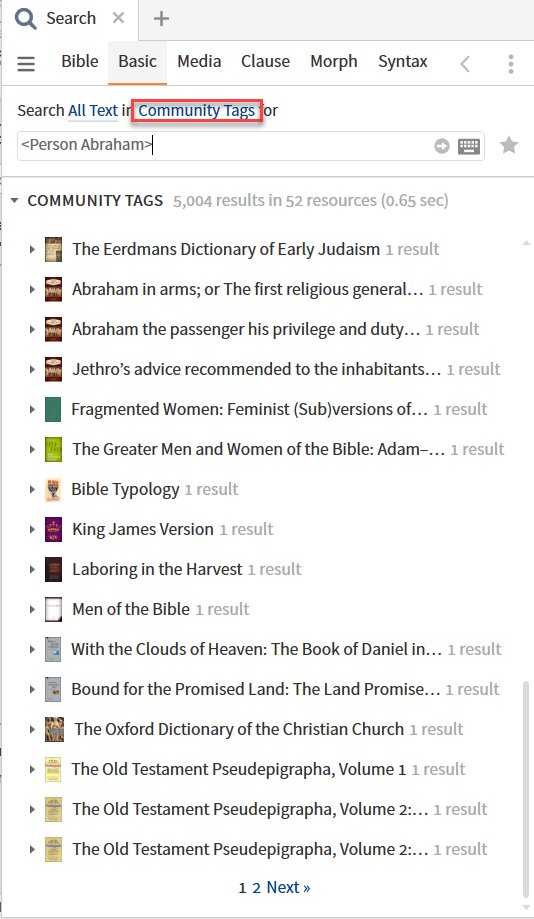
So which Zechariah do I want? Some names or titles come back with so many options on the pick list that it is difficult to determine which one is the one you want. If you know the Bible Passage in which the name occurs, one can use the Context Menu or Information Panel to determine the correct datatype value:
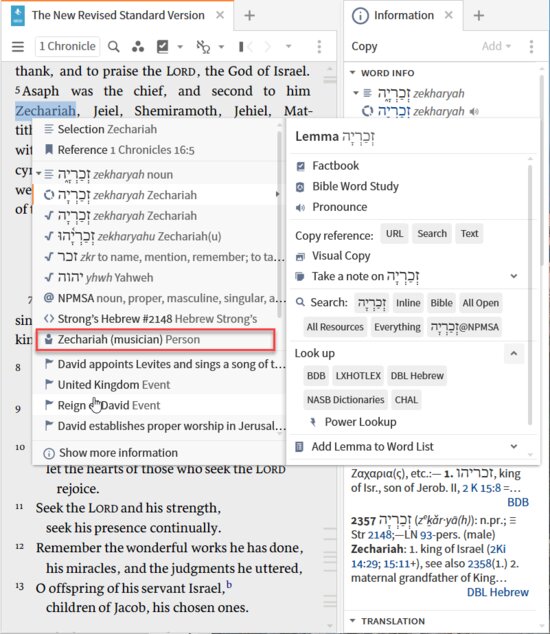
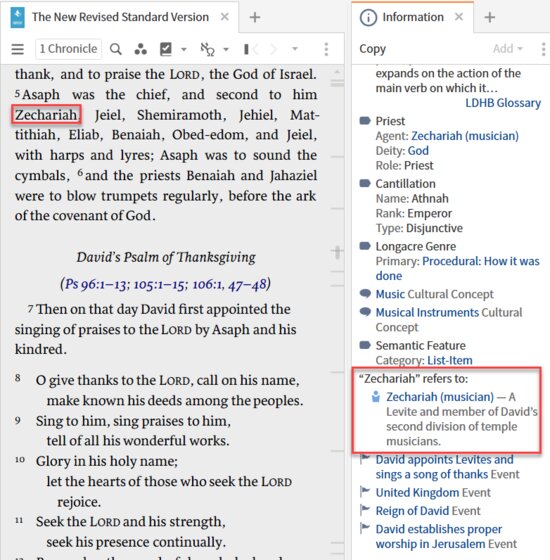
If you don’t know a passage with a reference, one can use Factbook to identify the correct entry. First enter the name to find the “Show all for nnnn” at the bottom of the select menu.
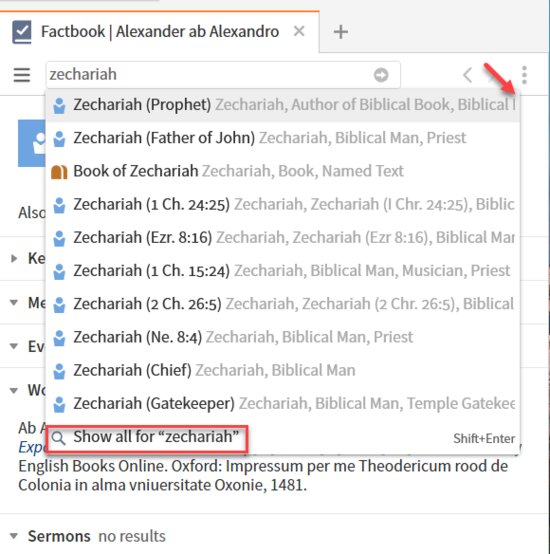
Scan the entries provided in the Top Results and Persons section – you may recognize the correct individual. Otherwise, find the personal name entry.
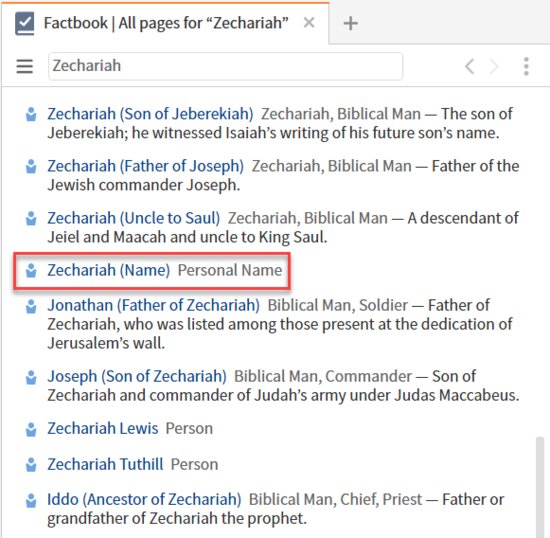
The Factbook Personal Name record provides Key Article and Dictionaries sections:
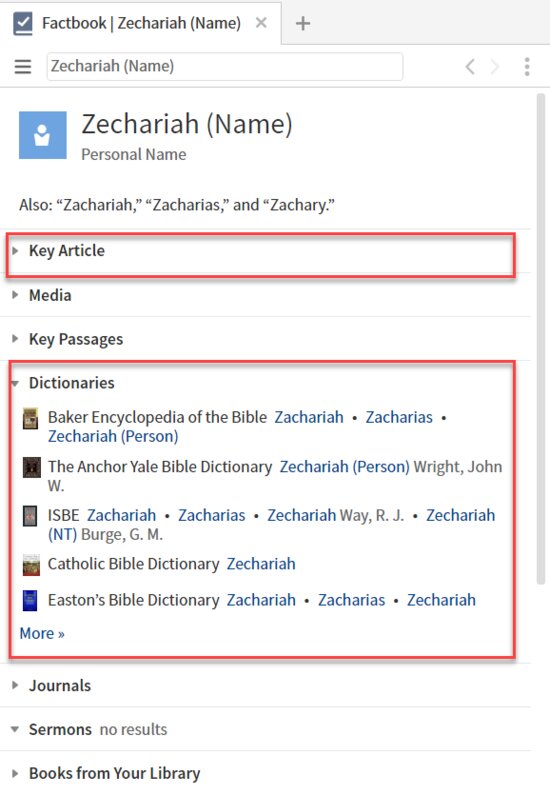
However, Verbum does not tag all people with a distinct label. From Sean Boisen:[quote]
We haven't yet shipped the dataset documentation for Biblical People (there's a lot to document!): but IIRC, as a matter of expediency, we only assigned unique identifiers to unnamed people who occurred at least five times in the text (or had some other rationale for distinguishing them). Otherwise we'd have piled up a lot of identifiers with virtually no information, which clutters other parts of the interface (like Factbook).
Example: in Gen 22:3, Abraham takes "two of his young men" with him to prepare to sacrifice Isaac. These young men are mentioned three times in this passage but not elsewhere, so we've curated no further information about them besides the generic "A servant".[2]
Factbook references using extensions
From Verbum Help:
[quote]These Factbook-related data types require {Section ...} extension terms:
• Event {Section <Event The Israelites cross the Red Sea>} — Finds items/text tagged with the specified event
• Sermon Theme {Section <PreachingTheme Wealth>} — Finds text tagged with the specified theme.
• Cultural Concept {Section <Culture Assassination>} — Finds text tagged with the specified cultural concept. Complete ontology can be found in the Lexham Cultural Ontology Glossary.
Note that cultural concepts are hierarchical in the same way as Bible Senses. The = and data type reference matching operators can be used to specify either this and only this heading (=) or this heading and all narrower/child headings ().
Biblical Annotation
Several datatypes associated with annotation of textual phenomena in the Bible require the {Section ...} syntax:
• Speech Acts — {Section <SpeechAct = Info: Assert>}
• Sentence Types — {Section <Sentence = Declarative>}
• Hebrew Grammatical Constructions — {Section <GrammaticalConstructions = Root Pairs>}
• Greek Grammatical Constructions — {Section <GrammaticalConstructions = 1st Condition>}
Other
• Literary Typing {Section <LiteraryTyping = Gospel>} — Complete list of types can be found in the Lexham Glossary of Literary Types.[3]
To show the scope of the various sections, I have built a filter for the pericope “The Proclamation of John the Baptist” using the coding from verse Mark 1:6 as displayed in the context menu:
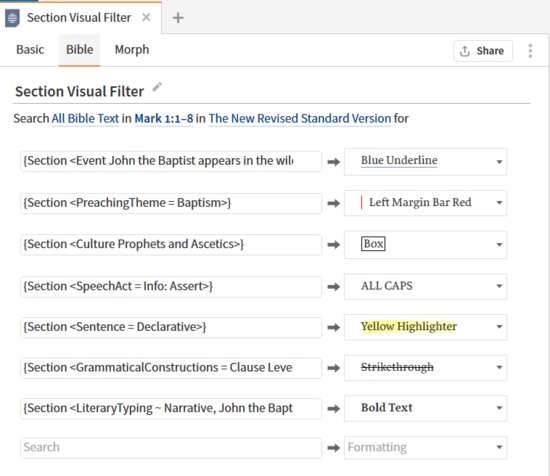
Comments:
- Only the lowest level event in the hierarchy is included in the filter
- Only the first of 12 preaching themes is included
- Only the second of 2 cultural concepts is included
- Only the second of 3 literary types is included
The results:
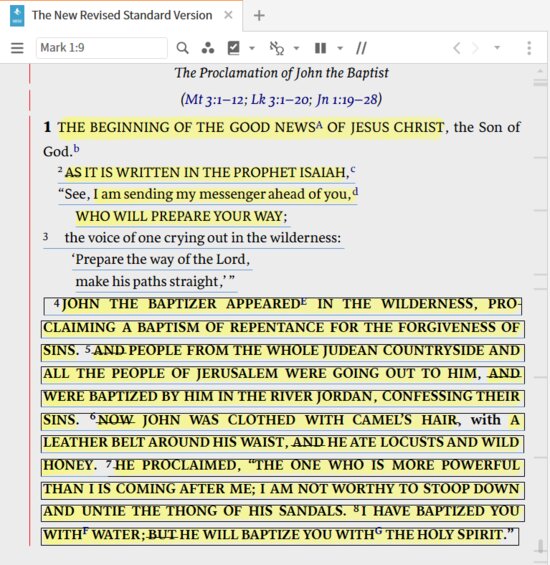
Datatypes of special interest to Catholics
Catechisms
|
Extended datatype example
|
Resources
|
|
{Milestone <CCC 1>}
|
- Catholic Church. Catechism of the Catholic Church. 2nd Ed. Vatican City: Libreria Editrice Vaticana, 1997.
- Catholic Church. Catechism of the Catholic Church. 2nd Ed. Washington, DC: United States Catholic Conference, 2000.
- Catholic Church. Catechismus Catholicae Ecclesiae. Vatican City: Libreria Editrice Vaticana, 1997.
- Iglesia católica. Catecismo de La Iglesia Católica. Vatican City: Libreria Editrice Vaticana, 2001.
|
|
{Milestone <RC = Rom. Cat. 1.1.1>}
|
- Catholic Church. The Catechism of the Council of Trent. Translated by Theodore Alois Buckley. London: George Routledge and Co., 1852.
- Catholic Church. The Catechism of the Council of Trent (Text only). Translated by Theodore Alois Buckley. London: George Routledge and Co., 1852.
- Zorita, Agustin, trans. Catecismo Del Santo Concilio de Trento Para Los Párrocos Ordenado Por Disposicion De San Pio V. Valencia: Don Benito Monfort, 1782.
|
|
None where expected
|
- Schönborn, Christoph, ed. Youcat English: Youth Catechism of the Catholic Church. Translated by Michael J. Miller. San Francisco: Ignatius Press, 2011.
|
|
{Milestone <RCCD = General Directory for Catechesis 1>}
|
- Congregation for the Clergy. General Directory for Catechesis. Washington, DC: United States Catholic Conference, 1998.
|
|
None
|
- Kreeft, Peter. Catholic Christianity: A Complete Catechism of Catholic Beliefs Based on the Catechism of the Catholic Church. San Francisco: Ignatius Press, 2001.
|
Church documents (selected)
|
Extended datatype example
|
Resources
|
|
None where expected
|
- Buckley, Theodore Alois. The Canons and Decrees of the Council of Trent. London: George Routledge and Co., 1851.
- Buckley, Theodore Alois. The Canons and Decrees of the Council of Trent (Text only). London: George Routledge and Co., 1851.
- McNabb, Vincent, ed. The Decrees of the Vatican Council. New York: Benziger Brothers, 1907.
|
|
{Milestone <CIC = CIC 76>}
|
- Code of Canon Law: New English Translation. Washington, DC: Canon Law Society of America, 1998.
- Codex Iuris Canonici. Vatican City: Libreria Editrice Vaticana, 1989.
|
|
{Milestone <CCEO = CCEO 1>}
|
- Code of Canons of the Eastern Churches: New English Translation. Washington, DC: Canon Law Society of America, 2001.
- Codex Canonum Ecclesiarum Orientalium. Vatican City: Libreria Editrice Vaticana, 1995.
|
|
{Milestone <RomanMissal = Proper of Time, Advent>}
|
- Catholic Church. Missale Romanum: Ex Decreto Sacrosancti Œcumenici Concilii Vaticani II Instauratum Auctoritate Pauli PP. VI Promulgatum Ioannis Pauli PP. II Cura Recognitum. Editio Typica Tertia. Vatican City: Libreria Editrice Vaticana, 2008.
- The Roman Missal: Renewed by Decree of the Most Holy Second Ecumenical Council of the Vatican, Promulgated by Authority of Pope Paul VI and Revised at the Direction of Pope John Paul II. Third Typical Edition. Washington D.C.: United States Conference of Catholic Bishops, 2011.
- Missing milestones: Catholic Church. Missale Romanum: Ex Decreto SS. Concilii Tridentini Restitutum Summorum Pontificum Cura Recognitum. Vatican City: Typis Polyglottis Vaticanis, 1962.
|
|
Vatican II documents
|
|
{Milestone <VaticanII = Sacrosanctum concilium 1>}
|
- Vatican Council II : The Conciliar and Post Conciliar Documents. Electronic ed. of the new revised ed. Vol. 1. Vatican Collection. Northport NY: Costello Publishing, 1992.
- Catholic Church. Vatican II Documents. Vatican City: Libreria Editrice Vaticana, 2011.
- Catholic Church. Vatican II Documents. Vatican City: Libreria Editrice Vaticana, 2011.
|
|
{Milestone <VaticanII = Inter mirifica 1>}
|
- Vatican Council II : The Conciliar and Post Conciliar Documents. Electronic ed. of the new revised ed. Vol. 1. Vatican Collection. Northport NY: Costello Publishing, 1992.
- Catholic Church. Vatican II Documents. Vatican City: Libreria Editrice Vaticana, 2011.
- Catholic Church. Vatican II Documents. Vatican City: Libreria Editrice Vaticana, 2011.
|
|
{Milestone <VaticanII = Orientalium Ecclesiarum 1>}
|
- Vatican Council II : The Conciliar and Post Conciliar Documents. Electronic ed. of the new revised ed. Vol. 1. Vatican Collection. Northport NY: Costello Publishing, 1992.
- Catholic Church. Vatican II Documents. Vatican City: Libreria Editrice Vaticana, 2011.
- Catholic Church. Vatican II Documents. Vatican City: Libreria Editrice Vaticana, 2011.
|
|
Papal Encyclicals
|
|
{Milestone <PapalDocuments = Verb. Dom. 1>}
|
- Benedict XVI. Verbum Domini. Vatican City: Libreria Editrice Vaticana, 2010.
- Benedict XVI. Verbum Domini. (Latin) Vatican City: Libreria Editrice Vaticana, 2010.
|
|
{Milestone <PapalEncyclicals = Veritatis Splendor 1>}
|
- John Paul II. Veritatis Splendor. Vatican City: Libreria Editrice Vaticana, 1993.
- Juan Pablo II. Veritatis Splendor (Español). Vatican City: Libreria Editrice Vaticana, 1993.
- John Paul II. Veritatis Splendor (Latin). Vatican City: Libreria Editrice Vaticana, 1993.
|
|
<PapalEncyclicals = Benedict XIV, Ubi primum 1>
|
- Carlen, Claudia, ed. The Papal Encyclicals: 1740–1878. Ypsilanti, MI: The Pierian Press, 1990.
|
Remember that {Milestone <PapalEncyclicals = Veritatis Splendor 1>} will find occurrences of the text while <PapalEncyclicals = Veritatis Splendor 1> will find references to the text.
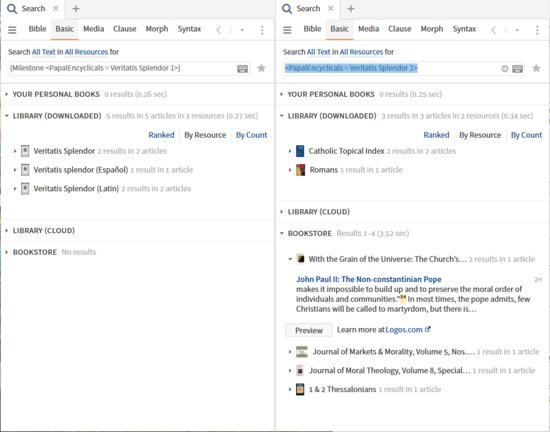
[1] Verbum Help (Bellingham, WA: Faithlife, 2018).
[2] DATA BUG: Reporting a missing person ... - Faithlife Forums (logos.com) accessed 4/6/2021 4:49 PM
[3] Verbum Help (Bellingham, WA: Faithlife, 2018).